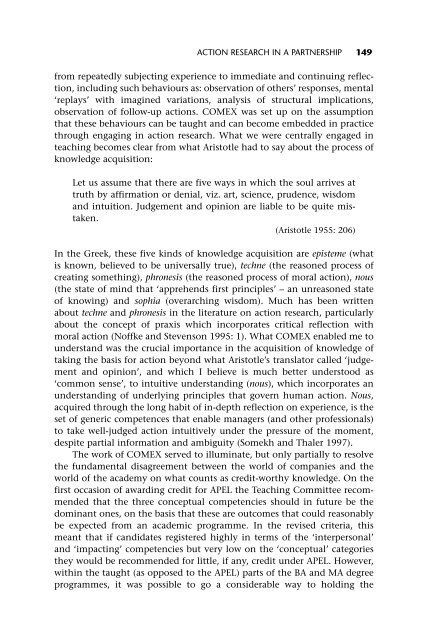Action Research A Methodology for Change and Development
Action Research A Methodology for Change and Development
Action Research A Methodology for Change and Development
You also want an ePaper? Increase the reach of your titles
YUMPU automatically turns print PDFs into web optimized ePapers that Google loves.
ACTION RESEARCH IN A PARTNERSHIP 149<br />
from repeatedly subjecting experience to immediate <strong>and</strong> continuing reflection,<br />
including such behaviours as: observation of others’ responses, mental<br />
‘replays’ with imagined variations, analysis of structural implications,<br />
observation of follow-up actions. COMEX was set up on the assumption<br />
that these behaviours can be taught <strong>and</strong> can become embedded in practice<br />
through engaging in action research. What we were centrally engaged in<br />
teaching becomes clear from what Aristotle had to say about the process of<br />
knowledge acquisition:<br />
Let us assume that there are five ways in which the soul arrives at<br />
truth by affirmation or denial, viz. art, science, prudence, wisdom<br />
<strong>and</strong> intuition. Judgement <strong>and</strong> opinion are liable to be quite mistaken.<br />
(Aristotle 1955: 206)<br />
In the Greek, these five kinds of knowledge acquisition are episteme (what<br />
is known, believed to be universally true), techne (the reasoned process of<br />
creating something), phronesis (the reasoned process of moral action), nous<br />
(the state of mind that ‘apprehends first principles’ – an unreasoned state<br />
of knowing) <strong>and</strong> sophia (overarching wisdom). Much has been written<br />
about techne <strong>and</strong> phronesis in the literature on action research, particularly<br />
about the concept of praxis which incorporates critical reflection with<br />
moral action (Noffke <strong>and</strong> Stevenson 1995: 1). What COMEX enabled me to<br />
underst<strong>and</strong> was the crucial importance in the acquisition of knowledge of<br />
taking the basis <strong>for</strong> action beyond what Aristotle’s translator called ‘judgement<br />
<strong>and</strong> opinion’, <strong>and</strong> which I believe is much better understood as<br />
‘common sense’, to intuitive underst<strong>and</strong>ing (nous), which incorporates an<br />
underst<strong>and</strong>ing of underlying principles that govern human action. Nous,<br />
acquired through the long habit of in-depth reflection on experience, is the<br />
set of generic competences that enable managers (<strong>and</strong> other professionals)<br />
to take well-judged action intuitively under the pressure of the moment,<br />
despite partial in<strong>for</strong>mation <strong>and</strong> ambiguity (Somekh <strong>and</strong> Thaler 1997).<br />
The work of COMEX served to illuminate, but only partially to resolve<br />
the fundamental disagreement between the world of companies <strong>and</strong> the<br />
world of the academy on what counts as credit-worthy knowledge. On the<br />
first occasion of awarding credit <strong>for</strong> APEL the Teaching Committee recommended<br />
that the three conceptual competencies should in future be the<br />
dominant ones, on the basis that these are outcomes that could reasonably<br />
be expected from an academic programme. In the revised criteria, this<br />
meant that if c<strong>and</strong>idates registered highly in terms of the ‘interpersonal’<br />
<strong>and</strong> ‘impacting’ competencies but very low on the ‘conceptual’ categories<br />
they would be recommended <strong>for</strong> little, if any, credit under APEL. However,<br />
within the taught (as opposed to the APEL) parts of the BA <strong>and</strong> MA degree<br />
programmes, it was possible to go a considerable way to holding the

















